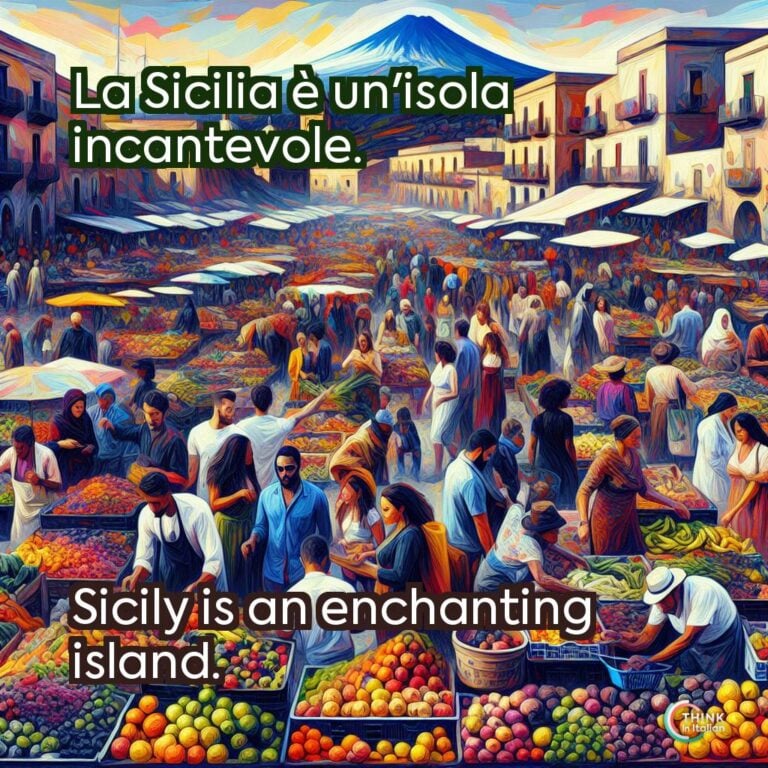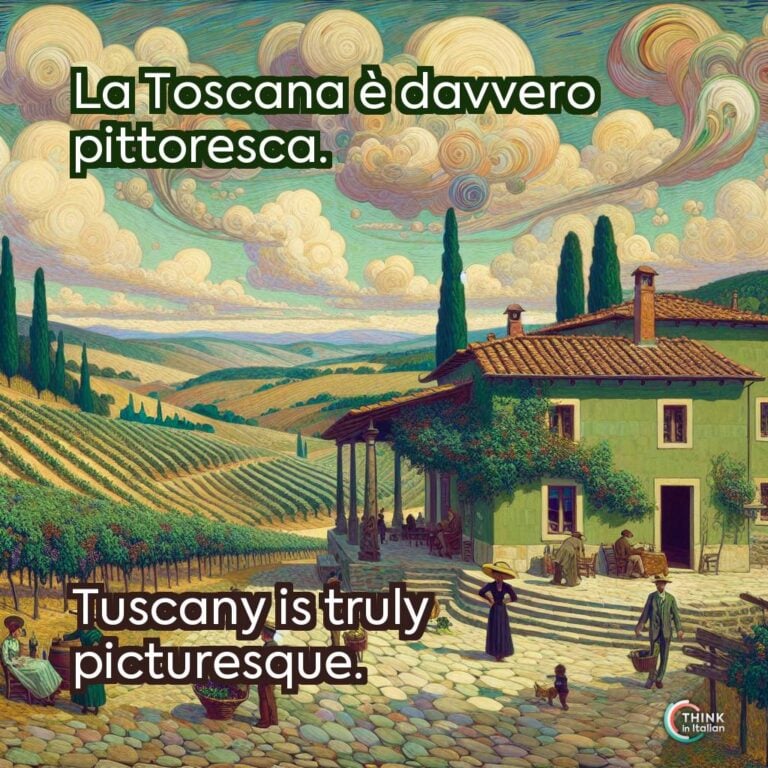Italian Adjectives
Before diving into the specifics of Italian adjectives to describe places, let me give you a brief overview.
Italian adjectives must always agree in gender and number with the noun they modify. Here, I will provide you with the masculine singular form of each one, but always make sure you know who the subject of the sentence is to properly use it.
Also, I will not be able to list all the existing adjectives, because, of course, there are many. Most are synonyms or shades of other meanings. Therefore, here I will list the most common ones with corresponding examples.
Finally, notice that I will mainly use the verb essere with all the adjectives, because, of course, we use adjectives to describe how places are. Get ready, and start learning now how to describe a person in Italian!
Italian Adjectives to Describe a Place
Adjectives for Beautiful Places
Italy is synonymous with beauty, and these adjectives capture its splendor:
- Bellissimo – very beautiful
Questo posto è bellissimo!
This place is very beautiful!
- Incantevole – enchanting
La vista dal balcone è incantevole.
The view from the balcony is enchanting.
- Pittoresco – picturesque
Questo borgo è davvero pittoresco.
This village is truly picturesque.
- Affascinante – charming, captivating
Una città affascinante piena di storia.
A charming city full of history.
- Splendido – splendid, stunning
Il panorama dal monte è splendido.
The view from the mountain is splendid.
- Suggestivo – evocative, atmospheric
La chiesa illuminata di notte è molto suggestiva.
The church lit up at night is very evocative.
- Stupefacente – astonishing
La vista dalla cima della torre è stupefacente.
The view from the top of the tower is astonishing.
- Meraviglioso – wonderful, marvelous
La cattedrale gotica è meravigliosa.
The Gothic cathedral is marvelous.
- Raffinato – refined, elegant
Un raffinato quartiere con palazzi storici.
A refined neighborhood with historic buildings.
- Paradisiaco – paradisiacal, heavenly
La spiaggia è un luogo paradisiaco con sabbia bianca e mare cristallino.
The beach is a heavenly place with white sand and crystal-clear sea.
Adjectives for Size and Space
Size and spaciousness matter when describing places:
- Grande – big, large
La piazza è molto grande.
The square is very big.
Questa casa ha un giardino grande e bello.
This house has a big and beautiful garden.
- Piccolo – small
Questo ristorante è piccolo ma accogliente.
This restaurant is small but cozy.
- Spazioso – spacious
L’appartamento è spazioso e luminoso.
The apartment is spacious and bright.
- Enorme – enormous, huge
Il parco è enorme e pieno di alberi.
The park is enormous and full of trees.
- Ampio – ample, wide
Il soggiorno è ampio e ben arredato.
The living room is ample and well-furnished.
- Largo – wide
Questa strada è larga e ben asfaltata.
This road is wide and well-paved.
- Stretto – narrow, tight
La porta è stretta, attento a non urtare.
The door is narrow, be careful not to bump into it.
- Minuscolo – tiny
Il negozio è minuscolo ma ben fornito.
The shop is tiny but well-stocked.
- Profondo – deep
Il pozzo è molto profondo.
The well is very deep.
- Basso – low
Le colline sono basse ma pittoresche.
The hills are low but picturesque.
Adjectives for Atmosphere
Capture the vibe of a location with these adjectives:
- Tranquillo – quiet, peaceful
Questo quartiere è tranquillo di notte.
This neighborhood is quiet at night.
- Vivace – lively
Il centro storico è sempre vivace.
The historic center is always lively.
- Accogliente – cozy, welcoming
Il bar è piccolo ma molto accogliente.
The bar is small but very cozy.
- Affascinante – charming, fascinating
Questo villaggio medievale è davvero affascinante.
This medieval village is truly charming.
- Rilassante – relaxing
Questo spa ha un’atmosfera molto rilassante.
This spa has a very relaxing atmosphere.
- Romantico – romantic
Venezia ha un’atmosfera incredibilmente romantica.
Venice has an incredibly romantic atmosphere.
- Caotico – chaotic
Il mercato è caotico ma affascinante.
The market is chaotic but fascinating.
- Rustico – rustic
Adoro questa trattoria per la sua atmosfera rustica.
I love this trattoria for its rustic atmosphere.
- Elegante – elegant
Questo hotel è elegante ma accogliente.
This hotel is elegant but welcoming.
- Inquietante – unsettling
Il castello abbandonato ha un’atmosfera inquietante.
The abandoned castle has an unsettling atmosphere.
Adjectives for Natural Settings
Italian landscapes evoke a range of emotions:
- Verde – green
La campagna è verde e rigogliosa.
The countryside is green and lush.
- Rigoglioso – lush, flourishing
Il giardino botanico è rigoglioso in primavera.
The botanical garden is lush in spring.
- Selvaggio – wild
Una selvaggia riserva naturale.
A wild nature reserve.
- Arido – arid
Il paesaggio è arido e brullo dopo l’estate.
The landscape is arid and barren after the summer.
- Montuoso – mountainous
Questa regione è montuosa e ricca di sentieri panoramici.
This region is mountainous and full of scenic trails.
- Limpido – clear
Il cielo è limpido e azzurro in montagna.
The sky is clear and blue in the mountains.
- Umido – humid, damp
La foresta è umida e ricoperta di muschio.
The forest is humid and covered in moss.
Adjectives for Urban Environments
Urban settings have their own charm:
- Affollato – crowded
Il mercato è sempre affollato il sabato.
The market is always crowded on Saturdays.
- Storico – historic
Questo edificio è molto storico e ben conservato.
This building is very historic and well-preserved.
- Moderno – modern
Il quartiere è moderno e pieno di grattacieli.
The neighborhood is modern and full of skyscrapers.
- Caotico – chaotic
Le strade della città sono caotiche durante il festival.
The city streets are chaotic during the festival.
- Silenzioso – quiet
Questo vicolo è silenzioso anche di giorno.
This alley is quiet even during the day.
- Animato – lively, bustling
Il quartiere è animato grazie ai tanti ristoranti e bar.
The neighborhood is lively thanks to the many restaurants and bars.
- Sporco – dirty
Alcune strade della città vecchia sono un po’ sporche.
Some streets in the old town are a bit dirty.
- Pulito – clean
Il centro città è sempre pulito e ben curato.
The city center is always clean and well-maintained.
- Vivace – lively
Il centro storico è sempre vivace di sera.
The historic center is always lively in the evening.
- Industriale – industrial
La zona industriale è piena di fabbriche e magazzini.
The industrial area is full of factories and warehouses.
Adjectives for Weather and Climate
Weather shapes the experience of a place:
- Soleggiato – sunny
La spiaggia è soleggiata tutto il giorno.
The beach is sunny all day.
- Ventoso – windy
La costa è ventosa ma bellissima.
The coast is windy but beautiful.
- Piovoso – rainy
La città è piovosa in autunno.
The city is rainy in autumn.
- Nuvoloso – cloudy
Oggi il cielo è nuvoloso, ma non dovrebbe piovere.
Today the sky is cloudy, but it shouldn’t rain.
- Freddo – cold
La montagna è molto fredda in inverno.
The mountain is very cold in winter.
- Caldo – hot, warm
L’estate qui è calda e soleggiata.
The summer here is hot and sunny.
- Umido – humid
La città è spesso umida a causa del fiume.
The city is often humid because of the river.
- Asciutto – dry
Il clima in questa zona è molto asciutto durante l’estate.
The climate in this area is very dry during the summer.
- Nevoso – snowy
Le Alpi sono nevose in dicembre.
The Alps are snowy in December.
- Fresco – cool
La sera diventa fresca anche in estate.
The evening becomes cool even in summer.
Adverbs for More Precise Descriptions
Using adverbs like molto (very), abbastanza (quite), or un po’ (a little) allows you to adjust the intensity of your adjectives, making your descriptions more accurate:
La piazza è molto grande.
The square is very big.
Il ristorante è abbastanza accogliente.
The restaurant is quite welcoming.
La spiaggia è leggermente ventosa.
The beach is slightly windy.
Ready to Describe Places in Italian
Italy is renowned for its enchanting landscapes, historic cities, and vibrant culture. It is a treasure trove of places worth describing in vivid detail.
Italian adjectives unlock the language’s descriptive potential, allowing you to paint vivid pictures of Italy’s beauty. By mastering these linguistic tools, you can connect more deeply with Italian culture, impress locals, and enrich your travel experiences.
Buon viaggio, and may your descriptions bring Italy to life!






